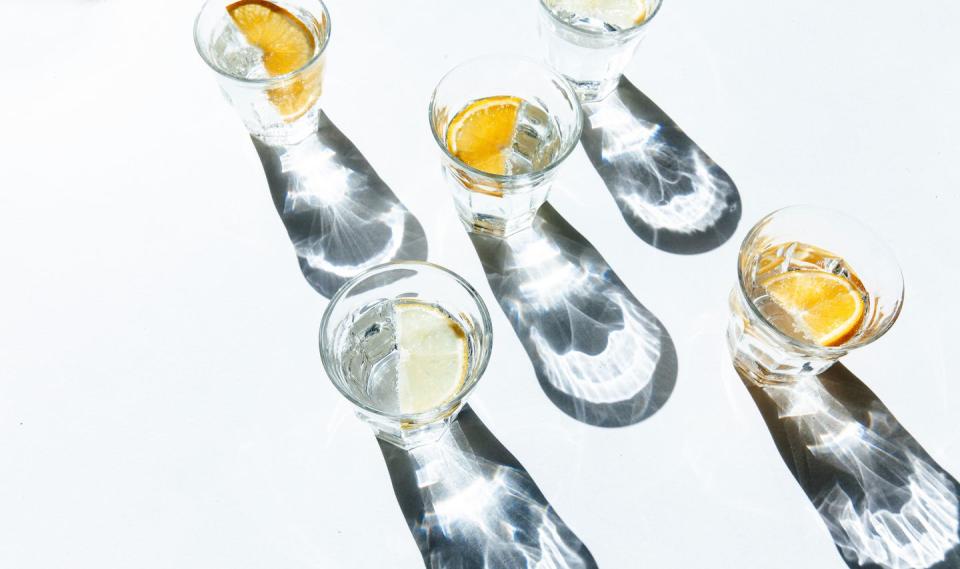The 5:2 for Your Face? Why Skin Fasting Isn't as Extreme as You Might Think

Skincare novelty is everywhere. Sheet masks spiked with snake venom, LED lights to zap your blemishes, specially formulated probiotics designed to clear your dermis from the inside out: the pace of change is constant.
But the latest news in the world of beauty isn't a gold-flecked IV drip solution or a unicorn breath eye mask. Instead, it's doing... nothing.
Skin fasting, a trend that's gaining traction over the Internet, involves taking a day or two a week to shake off your make-up and moisturiser, to encourage your skin to produce its own hydration, in the form of your natural oils.
Skin fasting: so, what is it?
Where skin fasting came from
The term was first coined, ironically, by a Japanese skin care company. In a 2011 blog post, The Mirai Clinical shared that a 'skin fast' is the practice of giving up your skincare routine for a set period of time.
Why? Because, they say, 'Becoming dependent on products that provide moisture, oils and other skin care lessen your skin’s natural rejuvenation system.'
This does not need to entail going sans product every day for a month – and the cracked lips and dry dermis that this would probably lead to. 'It’s as simple as sleeping without a moisturiser only one night a week,' the post elaborates.
So it's less a month without any cleanser, and more a facial 5:2 diet where your two days see you use a super pared back, simple product selection.

What's the point of a skin fast?
By minimising products or not using any once or twice a week, the fast is supposed to help strengthen back our skin's natural protective barrier that can be weakened by a thorough – yet maximalist – skincare regime.
By using intensive regimes in which we layer up multiple products, it's said that we effectively allow our skin to become lazy. It doesn't need to produce our natural hydration system, in the form of oils, and so let's that slide.
Skin fasting: what does a dermatologist have to say?
Bold claims have been made regarding the potential power of a skin fast. So WH asked dermatologist Dr. Justine Kluk for her thoughts.
'There is no peer-reviewed scientific data that I have been able to find to support the new trend of skin fasting,' she says. The best regime, in her opinion, is one that's 'carefully considered and tailored for you'.
That's not to say that there's zero merit to the idea. 'The concept of skin fasting does raise some important and relevant questions,' she continues. 'In the past five years, it's become the norm to adopt and layer multiple different products across morning to night.
'I am constantly telling my patients to simplify their routines, as I’m sure this is one of the contributing factors in the rise of adult acne.'

Though Dr. Kulk cannot recommend skin fasting from a scientific perspective, she does that it's: 'A good opportunity to stop, review all the steps in your daily routine and ask if they’re all absolutely necessary.'
Skin fasting: giving it a spin
So, what's it like to actually try it? WH digital beauty and health Editor Claudia Canavan thought she'd give it a try. 'I’ve been ‘skin fasting’ for the past two weeks, by spending a night with no product on, and one day a week (Sunday) wearing zero make-up,' she says.
For Canavan, there is a big difference between going make-up free and using no skincare products. 'On no make-up days, I still use my cleanser, moisturiser and serum, so my face feels nourished,' she explains.
The no product thing is a different story. 'After taking my make-up off after work, not patting on my retinol, under eye cream and heavy duty night cream feels weird. My skin feels dry and almost itchy – which is a sign that it's too reliant on the hydration it gets from products,' she elaborates.
Instead of believing that skin fasting is a waste of everyone's time, what Canavan has realised is that her skin is overly dependent on products.
'After two weeks, I can’t say I can see any visible difference in my skin. However, I have no doubt that giving my face a make-up break every seven days is a good shout, in terms of letting my pores breathe.

'Plus, it's made me realise that all I really need is a good cleanse and moisturise, with a gentle exfoliation a few times a week, rather than five layers involving serums, eye creams and masks.'
Fancy giving it a try? Here's how to skin fast
If you fancy resetting your relationship to your skincare, then try this.
Begin the fast by removing one product one night a week from your routine for a few weeks and measure any difference.
Drink plenty of water, to stay hydrated from the outside, and, in the morning, wash your face using only H20, so that you're not yanking the natural oils from your face.

If you're going to remove a night time moisturiser from your regime, only do so if you're not on medication, and are not using retinol that will dry out your skin. If you've recently had a peel, that's also a no-no. If you have a skin issue that's serious, don't stop applying your creams without professional medical advice.
Skin fasting might not give you the complexion of Miranda Kerr. But worst case scenario? You see that you don't need quite so many bottles lining your bathroom cabinet, after all.


